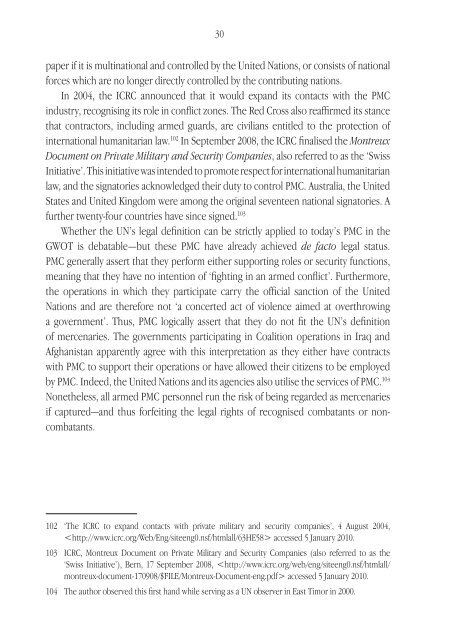30paper if it is multinational and controlled by <strong>the</strong> United Nations, or consists of nationalforces which are no longer directly controlled by <strong>the</strong> contributing nations.In 2004, <strong>the</strong> ICRC announced that it would expand its contacts with <strong>the</strong> PMCindustry, recognising its role in conflict zones. The Red Cross also reaffirmed its stancethat contractors, including armed guards, are civilians entitled to <strong>the</strong> protection ofinternational humanitarian law. 102 In September 2008, <strong>the</strong> ICRC finalised <strong>the</strong> MontreuxDocument on Private Military and Security Companies, also referred to as <strong>the</strong> ‘SwissInitiative’. This initiative was intended to promote respect for international humanitarianlaw, and <strong>the</strong> signatories acknowledged <strong>the</strong>ir duty to control PMC. Australia, <strong>the</strong> UnitedStates and United Kingdom were among <strong>the</strong> original seventeen national signatories. Afur<strong>the</strong>r twenty-four countries have since signed. 103Whe<strong>the</strong>r <strong>the</strong> UN’s legal definition can be strictly applied to today’s PMC in <strong>the</strong>GWOT is debatable—but <strong>the</strong>se PMC have already achieved de facto legal status.PMC generally assert that <strong>the</strong>y perform ei<strong>the</strong>r supporting roles or security functions,meaning that <strong>the</strong>y have no intention of ‘fighting in an armed conflict’. Fur<strong>the</strong>rmore,<strong>the</strong> operations in which <strong>the</strong>y participate carry <strong>the</strong> official sanction of <strong>the</strong> UnitedNations and are <strong>the</strong>refore not ‘a concerted act of violence aimed at overthrowinga government’. Thus, PMC logically assert that <strong>the</strong>y do not fit <strong>the</strong> UN’s definitionof mercenaries. The governments participating in Coalition operations in Iraq andAfghanistan apparently agree with this interpretation as <strong>the</strong>y ei<strong>the</strong>r have contractswith PMC to support <strong>the</strong>ir operations or have allowed <strong>the</strong>ir citizens to be employedby PMC. Indeed, <strong>the</strong> United Nations and its agencies also utilise <strong>the</strong> services of PMC. 104None<strong>the</strong>less, all armed PMC personnel run <strong>the</strong> risk of being regarded as mercenariesif captured—and thus forfeiting <strong>the</strong> legal rights of recognised combatants or noncombatants.102 ‘The ICRC to expand contacts with private military and security companies’, 4 August 2004, accessed 5 January 2010.103 ICRC, Montreux Document on Private Military and Security Companies (also referred to as <strong>the</strong>‘Swiss Initiative’), Bern, 17 September 2008, accessed 5 January 2010.104 The author observed this first hand while serving as a UN observer in East Timor in 2000.
31National laws and accountabilityAt <strong>the</strong> national level, mercenarism has rarely attracted significant legal attention. Forthis reason, PMC generally operate outside <strong>the</strong> framework of legal accountability.In <strong>the</strong> United States, <strong>the</strong> Neutrality Act was originally enacted in 1794 andrevised in 1937 following <strong>the</strong> Spanish Civil War. The Act prohibits <strong>the</strong> recruitment ofmercenaries on US territory. During <strong>the</strong> 1970s, accepting mercenary employment waswidely believed to result in <strong>the</strong> loss of US citizenship although, under contemporaryUS law, mercenary activity is not a crime unless o<strong>the</strong>r criminal or international lawsare breached. 105 Prior to his election, President Barack Obama promised to tightencontrol on <strong>the</strong> operations of PMC. His administration has since determined thatUS PMC operating in conflict zones must adhere to <strong>the</strong> Uniform Code of MilitaryJustice. 106In <strong>the</strong> United Kingdom, <strong>the</strong> Foreign Enlistment Act of 1870 was originally intendedto prevent British subjects from jeopardising British foreign policy, and arose from<strong>the</strong> difficulty of British neutrality during <strong>the</strong> American Civil War ra<strong>the</strong>r than as ameans of prohibiting mercenarism. There have been no convictions under <strong>the</strong> Act,suggesting that <strong>the</strong> issue has been largely avoided. 107 Following <strong>the</strong> prosecution of<strong>the</strong> British mercenaries in Angola in 1975, Lord Diplock told <strong>the</strong> British Governmentthat mercenarism per se should not constitute a crime, although <strong>the</strong> recruitmentof mercenaries to fight in foreign conflicts may be considered so. 108 Mockler arguesthat <strong>the</strong> Neutrality Act and Foreign Enlistment Act are virtually dead letters. 109 TonyGeraghty agrees, pointing out that:Such inactivity derives from <strong>the</strong> fact that some freelance operators can be veryuseful to government from time to time, and that this consideration outweighs<strong>the</strong> occasional embarrassment. 110105 Hoare, Congo Mercenary, p. 241; and Kwakwa, The International Law of Armed Conflict,pp. 116–18.106 N Hodge, ‘PSCs become US election issue’, Jane’s Defence Weekly, 12 March 2008, p. 9.107 Burchett and Roebuck, The Whores of War, pp. 184–96; Shearer, Private Armies and MilitaryIntervention, p. 20.108 Kwakwa, The International Law of Armed Conflict, pp. 118–19.109 Mockler, The New Mercenaries, p. 356.110 Geraghty, Who Dares Wins, p. 133.
- Page 1 and 2: Land Warfare Studies CentreWorking
- Page 3 and 4: Land Warfare Studies CentreThe Aust
- Page 5: IntroductionPrivate military compan
- Page 8 and 9: 4financial reward. Thus, mercenaris
- Page 10 and 11: 6were widely respected for their mi
- Page 12 and 13: 8The Industrial Revolution allowed
- Page 14 and 15: 10The post-colonial struggles of Af
- Page 16 and 17: 12only the standard pay rates to th
- Page 18 and 19: 14Under pressure from the South Afr
- Page 20 and 21: 16in Iraq outnumbered US troops on
- Page 22 and 23: 18mercenaries was arrested by Zimba
- Page 24 and 25: 20children are actually sent into p
- Page 27 and 28: Part Two - IssuesThe use of PMC in
- Page 29 and 30: 25of Western nations rely heavily o
- Page 31 and 32: 27use of mercenaries to fight movem
- Page 33: 29(b) Is motivated to take part the
- Page 37 and 38: 33The recruitment of personnel in A
- Page 39 and 40: 35Command and control are problemat
- Page 42 and 43: 381. International Register of PMC.
- Page 45: 41March 1987,SydneyMay 1988,SydneyM
- Page 49 and 50: 45Dinnen, S, May, R and Regan, A J,
- Page 51: 47Military Professional Resources I
- Page 54 and 55: PMC references published during the
- Page 56 and 57: 52Hider, J, ‘Private guards to lo
- Page 58: 54Republic of South Africa, ‘The
- Page 61 and 62: Land Warfare Studies CentrePublicat
- Page 63 and 64: 59107 de Somer, Greg and David Schm
- Page 65: 61BooksWahlert, G (ed.), Australian
















